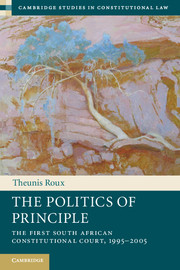Book contents
- Frontmatter
- Contents
- Acknowledgements
- Introduction
- Part I Problematic, Theory, Methodology
- Part II Context
- Part III Thematic Case Studies
- 6 Death, desire and discrimination: the Chaskalson Court between constitutional and positive morality
- 7 Social rights
- 8 Property rights
- 9 Political rights
- 10 Cross-cutting strategies
- Conclusion
- Bibliography
- Index
6 - Death, desire and discrimination: the Chaskalson Court between constitutional and positive morality
Published online by Cambridge University Press: 05 April 2013
- Frontmatter
- Contents
- Acknowledgements
- Introduction
- Part I Problematic, Theory, Methodology
- Part II Context
- Part III Thematic Case Studies
- 6 Death, desire and discrimination: the Chaskalson Court between constitutional and positive morality
- 7 Social rights
- 8 Property rights
- 9 Political rights
- 10 Cross-cutting strategies
- Conclusion
- Bibliography
- Index
Summary
A rights-based constitution embodies a moral vision of society that judges must elaborate using methods acceptable to the legal profession and the broader political community. Although there is considerable disagreement about what this task entails, it is clear that the constitution’s morality is not the same thing as ‘positive morality’, either in the form of traditional social values or public opinion. To be sure, positive morality will influence the choice of constitutional values at the time of the constitution’s making. These constitutionalised moral values may thereafter inform public discussion about the desirability of particular legislative measures or executive conduct. In the end, however, the content of the constitution’s morality in a system of supreme-law judicial review falls to be determined by the courts. Whatever the degree of popular control over the judicial appointments process, and however much professionally accepted methods of interpretation allow judges to give effect to the framers’ intentions and widely held social views, there is likely to be some degree of divergence between the morality the judges impute to the constitution and positive morality in either form.
In South Africa, where the Constitution was the product of a negotiated settlement between political parties whose bargaining power was disproportional to the extent of their public support, the possibility of this kind of divergence was particularly real. As we have seen, the political ideology informing the Bill of Rights in the 1996 Constitution, and to a lesser extent the 1993 Constitution as well, is extremely progressive. In part, this is attributable to the ANC’s human rights tradition and its ability, as the dominant force in South African politics, to ensure that its views, particularly on socio-economic rights, were reflected.
- Type
- Chapter
- Information
- The Politics of PrincipleThe First South African Constitutional Court, 1995–2005, pp. 235 - 261Publisher: Cambridge University PressPrint publication year: 2013

